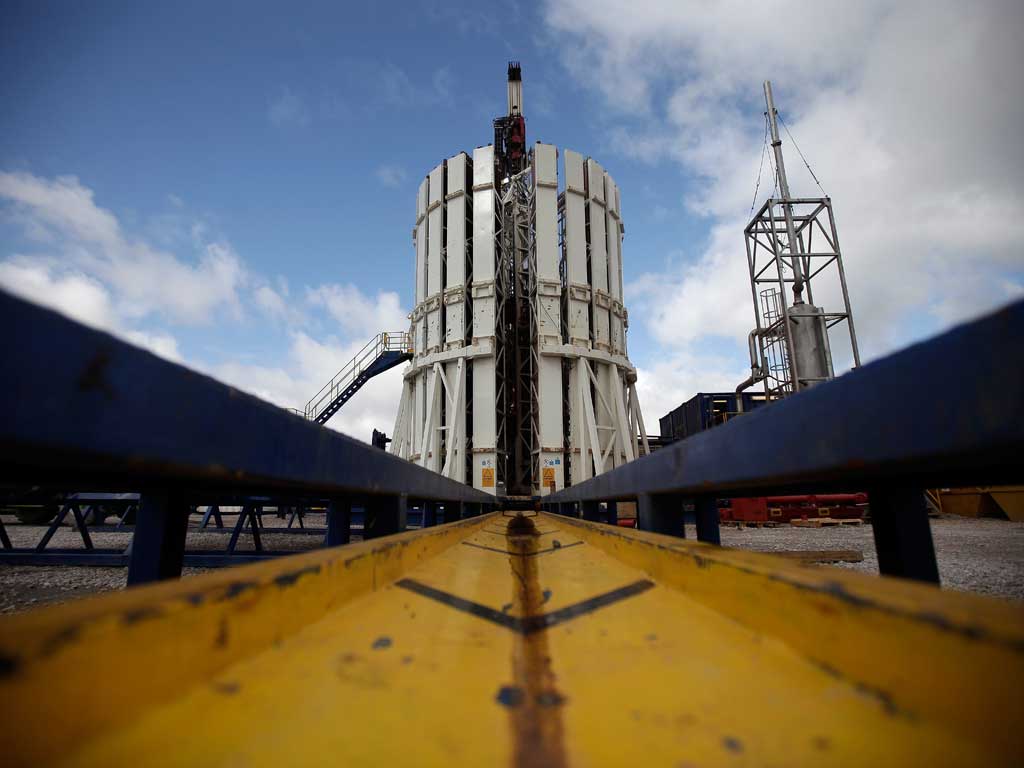The great rush: Government to give green light to mass exploration for shale gas
'Fracking' exploration could affect 60 per cent of UK, despite safety fears

More than 60 per cent of the British countryside could be exploited for shale gas, government documents show, as ministers prepare to give the go-ahead for developing the country's most significant new energy source since North Sea oil.
The Independent understands that Ed Davey, the Energy Secretary, will soon end the current moratorium on shale gas production, which was put in place after fracking caused two small earthquakes near Blackpool in 2011.
His decision will pave the way for a significant increase in shale gas exploration. The Chancellor, George Osborne, is also expected to announce the creation of a new Office for Shale Gas to co-ordinate and speed up production as part of his autumn statement next week. Fracking, or hydraulic fracturing, is the use of pressurised liquid to propagate fractures in rock and release natural gas.
Maps, drawn up by the Department of Energy and Climate Change, and seen by The Independent, show the extent of potential development.
They suggest more than 32,000 square miles – or 64 per cent of the countryside – could potentially be exploited for shale gas and is being considered for exploration licences.
It includes vast swathes of the South of England, the North-west and North- east and the Central belt in Scotland.
Meanwhile, government emails released to the environmental group Greenpeace under the Freedom of Information Act show the extent to which officials in both the DECC and the Environment Agency have gone to reassure the public about the risks.
A briefing on a proposed environmental risk assessment of fracking by the Environment Agency notes that the project must be completed quickly to allow the industry to develop.
"Government policy is clear, it wants the industry to develop. However, the main barrier is the public perception of the risk it poses to the environment," the Environment Agency's adviser on climate change, Martin Diaper writes.
In April, concerns were raised in the Sussex village of Balcombe about proposals by US firm Cuadrilla to drill for shale. Cuadrilla had permission for exploratory drilling but residents became alarmed after a study by Durham University suggested fractures from drilling could reach the water supply. Initial guidance from the Environment Agency was unequivocal. It read: "The agency would not allow hydraulic fracking to take place in an area where there are aquifers."
But that was not released to the public. Instead the Environment Agency's head of climate change suggested the wording be changed so not to provide "too stark" a stance.
The "dash for shale gas" is being promoted in Government by Mr Osborne. However, the Liberal Democrats are more sceptical. "We keep saying to the Tories that their shale gas revolution won't be acceptable to people who live next door to it," said a source close to Mr Davey.
John Sauven, executive director of Greenpeace UK, also predicted opposition to fracking which would "pale in comparison" to the anger over wind farms. "Pinning the UK's energy hopes on shale gas is a reckless gamble," he said. "We should instead be investing in clean, safe, renewable energy."
A spokesman for the DECC said: "There is a big difference between the amount of shale gas that might exist and what can be extracted. It is too early to assess the potential for shale gas but the suggestion more than 60 per cent of the UK countryside could be exploited is nonsense." He said a geological survey had been commissioned, which would report its findings next year.
An Environment Agency spokesman said: "We take the potential environmental risks very seriously, and have undertaken a thorough assessment of those risks."
For the full emails, see www.greenpeace.org.uk/energydesk
Subscribe to Independent Premium to bookmark this article
Want to bookmark your favourite articles and stories to read or reference later? Start your Independent Premium subscription today.

Join our commenting forum
Join thought-provoking conversations, follow other Independent readers and see their replies